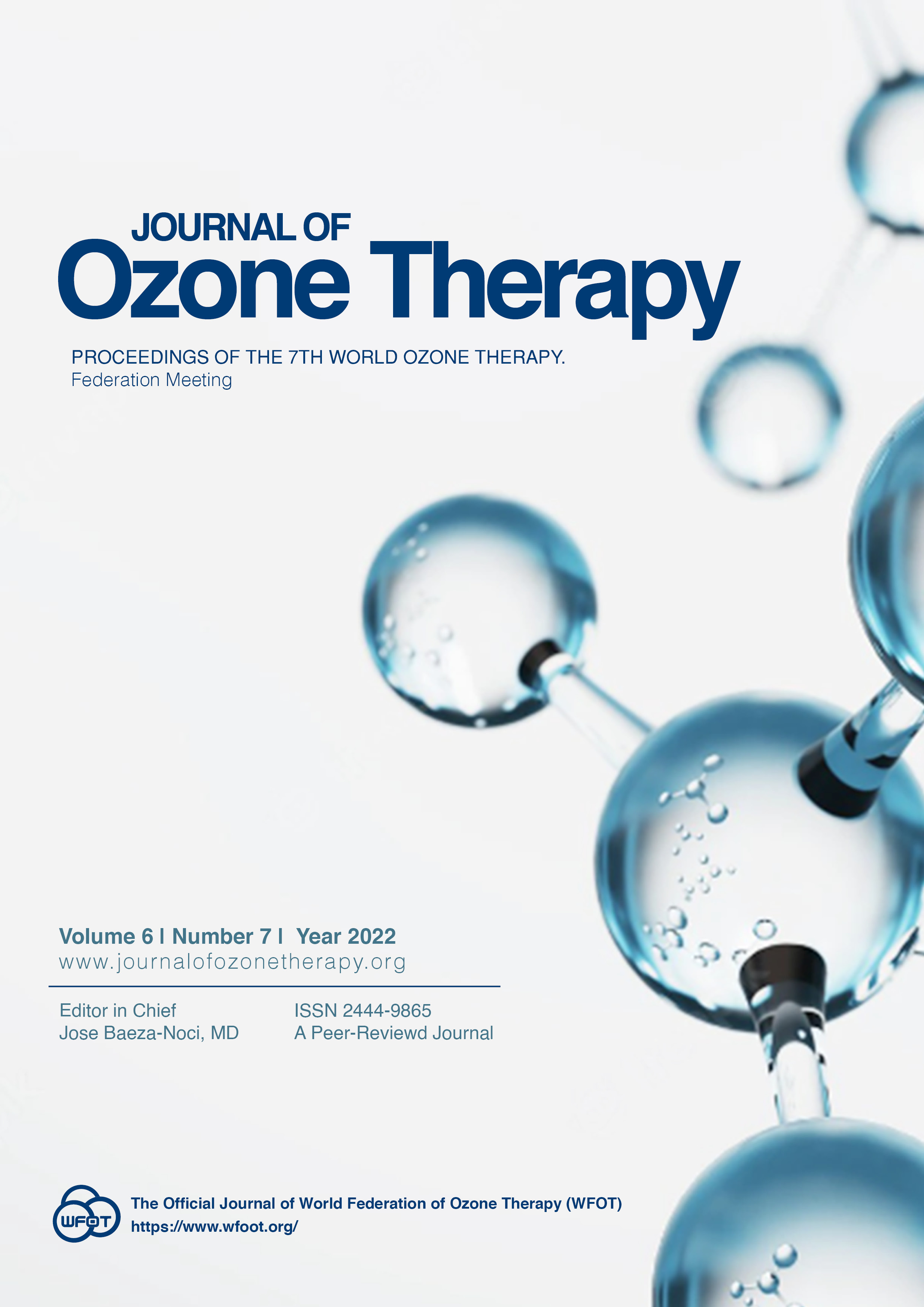Integration of ozone therapy for head and neck infective and chronic disease
DOI:
https://doi.org/10.7203/jo3t.0.0.2024.11332Keywords:
ozone, integration, detoxification, reparative osteogenesis Abstract
Abstract
Treatment and management of complex chronic disease states within the head and neck have traditionally been treated within the scope and philosophy of allopathic based dental/medical model. Success is therapeutically based upon three stanchions symptomology, pharmacology and surgical intervention. As with the successes of any therapeutic model some complications are possible. Symptomatic treatment does not address the root causality of the disease process. In addition, the patient can experience pharmaceutical side effects and post-surgical compilations such as infection and impaired healing processes. Ozone therapy as part of an Integrative Biologic Dental Medicine model has allowed for a paradigm shift in thinking and approach to the ever-growing problems of therapy resistant infection, aging population and chronic long term aliments. The management of acute and chronic infective disease is a critical factor in the overall health and wellness of patients. The head and neck are principle areas of infective disease. Primary contributors to this issue are infections of odontogenic and/or osteogenic origins. Ozone therapy has become one of the principle therapeutic modalities utilized in Integrative Biologic Dental Medicine “IBDM’. The objective of this paper will be to explain and demonstrate specifically how ozone therapy is utilized in dental medicine. Through specific micro-dosing and anatomic placement of ozone enhanced healing processes can occur. Reparative osteogenesis is one corner stone in the restoration and maintenance of human jaw integrity
 Downloads
Downloads
 References
References
Cannon WB. The Wisdom of the Body. New York: W. W. Norton; 1960.
Council NR. The language of life: How cells communicate in health and disease. Washington, DC: The National Academy Press; 2005.
Pischinger A. The extracellular matrix and ground regulation; basis for a holistic biological medicine. Berkeley (CA): North Atlantic Books; 2007. 205 p. ISBN: 1556436882.
Hernandez J, Varkey P. Vertical versus lateral thinking. Physician Exec. 2008;34(3):26-28.
Mollica P. Pischinger Memorial Lecture. Bozeman (MT): ACIMD Press; 2010.
Alberts B, Johnson A, Lewis J, Raff M, Roberts K, Walter P. Molecular biology of the cell. New York: Garland Science; 2002. 1616 p. ISBN: 9780815332183.
Fernandez O. Fundamental scientific facts about Medical Ozone In: Proceedings of European Ozone Congress. Vienna (AT): 2011.
Viebahn-Hansler R. The Use of Ozone in Medicine. 5th ed. Iffezheim (DE): ODREI-Publishers; 2007. ISBN: 1620556081.
Bocci V. Ozone A New Medical Drug. Dordrecht (NL): Springer; 2005. 295 p. ISBN: 1402031394.
Mollica P, Harris R. Cyto-Immunologic supportive therapies for ozone therapy in Dentistry. New Jersey (NJ): ACIMD Press; 2007.
Swayne J. Dictionary of Homeopathy. Bruxelles (BE): European Commission Medicine Research Group; 1996.
Calabrese EJ, Blain R. The occurrence of hormetic dose responses in the toxicological literature, the hormesis database: an overview. Toxicol Appl Pharmacol. 2005;202:289-301.
Dosch P. Manual of neural therapy according to Huneke. Stuttgart (DE): Thieme Publishers; 2007. 416 p. ISBN: 9783131406026.
Dore M. Chime des oxydants et traitemant des eaux. Technique et documentation. Paris (FR): Lavoisler; 1980. 350 p.
Schüring J, Schulz HD, Fischer WR, Böttcher J, Duijnisveld WH. Redox: Fundamentals, Processes and Applications. Heidelberg (DE): Springer-Verlag; 1999. 248 p. ISBN: 3540665285.
Nelson D, Cox M. Lehninger. Principles of Biochemistry. 5th ed. New York (NY): W.H. Freeman and Company; 2008. 1146 p. ISBN: 9780716771081.
Meisenberg G, Simmons W. Principles of Medical Biochemisty. St. Louis (MO): Mosbey; 1998. 742 p. ISBN: 0815144105.
Smit A, O’Byrne A, Van-Brandt B, Bianchi I, Kuestermann K. Introduction to Bioregulatory Medicine. New York (NY): Thieme; 2009. 166 p. ISBN: 9783131476111.
Gabreëls FJ, Prick MJ, Trijbels JM, Renier WO, Jaspar HH, Janssen AJ, et al. Defects in citric acid cycle and the electron transport chain in progressive poliodystrophy. Acta Neurol Scand. 1984;70(3):145-154.
Mainwood GW, Renaud JM. The effect of acid-base balance on fatigue of skeletal muscle. Can J Phy Pharmacol. 1985;63(5):403-416.
Crinnion WJ. Environmental medicine. Part 1: the human burden of environmental toxins and their common health effects. Altern Med Rev. 2005;5(1):52-63.
Blaylock R. Excitotoxins. The taste that kills. Santa Fe (NM): Health Press; 1994.
Bianchi I. Principles of Homotoxicology. Vol. 1. Baden-Baden (DE): Aurelia-Verlag Publishers; 1989. 201 p. ISBN: 9780224020831.
Schenkein HA, Loos BG. Inflammatory mechanisms linking periodontal disease to cardiovascular diseases. J Clin Periodontol. 2013;40(14):51-69. doi: 10.1111/jcpe.12060.
Gude D, Koduganti R, Prasanna S, Pothini L. Mouth: A portal to the body. Dent Res J. 2012;9(6):659-664.
Bocci V, Di-Paolo N. Oxygen-ozone therapy in medicine: an update. Blood Purif. 2009;28(4):373-376. doi: 10.1159/000236365.
Mollica P, Harris R. Oxygen. Ozone Therapy: Healing Periodontal Disease. Bozeman (MT): ACIMD Press; 2014.
Abid M, Javed F. Knowledge of medical practitioners about Periodontal Diseases and its impact on overall health: A cross sectional study. Cureus. 2018;10(5):2694. doi: 10.7759/cureus.2694.
Downloads
Published
How to Cite
-
Abstract476
-
PDF134
Issue
Section
License
Journal of Ozone Therapy applies the Creative Commons Attribution-NonCommercial 4.0 International License (CC BY NC 4.0) license to works we publish.
Under this license, authors retain ownership of the copyright for their content, but allow anyone to download, reuse, reprint, modify, distribute and/or copy the content as long as the original authors and source are cited. No permission is required from the authors or the publishers.
You may not use the material for commercial purposes.
Appropriate attribution can be provided by simply citing the original article, provide a link to the license, and indicate if changes were made.
You may do so in any reasonable manner, but not in any way that suggests the licensor endorses you or your use.





